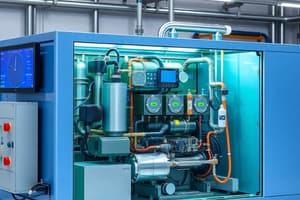Podcast
Questions and Answers
Hydrogen fuel cell cars produce harmful tailpipe emissions.
Hydrogen fuel cell cars produce harmful tailpipe emissions.
False (B)
In polymer electrolyte membrane (PEM) fuel cells, protons travel through the anode to the cathode.
In polymer electrolyte membrane (PEM) fuel cells, protons travel through the anode to the cathode.
False (B)
Hydrogen fuel cell cars are less efficient compared to other types of vehicles.
Hydrogen fuel cell cars are less efficient compared to other types of vehicles.
False (B)
The hydrogen molecules in a fuel cell break apart into electrons and protons.
The hydrogen molecules in a fuel cell break apart into electrons and protons.
The primary focus of hydrogen fuel cell cars is to reduce greenhouse gas emissions.
The primary focus of hydrogen fuel cell cars is to reduce greenhouse gas emissions.
Hydrogen fuel cell cars emerged as a concept only after 2010.
Hydrogen fuel cell cars emerged as a concept only after 2010.
Hydrogen cars face challenges such as a lack of infrastructure for recharging and the high cost of producing clean hydrogen.
Hydrogen cars face challenges such as a lack of infrastructure for recharging and the high cost of producing clean hydrogen.
Most of today's hydrogen is extracted from solar or wind power, which produces carbon dioxide as a byproduct.
Most of today's hydrogen is extracted from solar or wind power, which produces carbon dioxide as a byproduct.
Efforts are being made towards transitioning to 'green' hydrogen, produced through electrolysis using excess electricity from renewable sources.
Efforts are being made towards transitioning to 'green' hydrogen, produced through electrolysis using excess electricity from renewable sources.
If the costs of producing cleaner forms of hydrogen continue to decrease, hydrogen may not become a viable alternative fuel for heavy-duty transportation like long-haul trucks.
If the costs of producing cleaner forms of hydrogen continue to decrease, hydrogen may not become a viable alternative fuel for heavy-duty transportation like long-haul trucks.
Toyota and Hyundai sold a significant number of hydrogen cars in the UK market in 2021.
Toyota and Hyundai sold a significant number of hydrogen cars in the UK market in 2021.
The infrastructure necessary for a European hydrogen distribution system is estimated to be low in cost, making governments and businesses willing to invest in it.
The infrastructure necessary for a European hydrogen distribution system is estimated to be low in cost, making governments and businesses willing to invest in it.
Study Notes
Hydrogen Fueled Cars
In the early 2000s, hydrogen-powered fuel cell cars emerged as an alternative to both electric and combustion engine vehicles. They were seen as a path towards universal green motoring. Hydrogen fuel cell cars use a propulsion system similar to electric vehicles, where energy stored as hydrogen is converted to electricity by the fuel cell. Unlike conventional internal combustion engine vehicles, these vehicles produce no harmful tailpipe emissions, only emitting water vapor and warm air.
Fuel Cell Technology
The most common type of fuel cell for vehicle applications is the polymer electrolyte membrane (PEM) fuel cell. In this technology, an electrolyte membrane is sandwiched between a positive electrode (cathode) and a negative electrode (anode). When hydrogen is introduced to the anode and oxygen (from air) is introduced to the cathode, the hydrogen molecules break apart into protons and electrons due to an electrochemical reaction in the fuel cell catalyst. Protons then travel through the membrane to the cathode. Electrons are forced to travel through an external circuit to perform work (providing power to the electric car), then recombine with the protons on the cathode side where the protons, electrons, and oxygen molecules combine to form water.
Advantages and Disadvantages
Hydrogen fuel cell cars have several advantages over other types of vehicles. They are more efficient and produce no harmful tailpipe emissions. Additionally, they have a driving range comparable to gasoline counterparts, with major automobile manufacturers offering a limited but growing number of production fuel cell electric vehicles (FCEVs). However, hydrogen cars face challenges such as the lack of infrastructure for refueling and the high cost of producing clean hydrogen.
Environmental Impact
While hydrogen itself is considered a green energy source when produced from renewable sources like solar or wind power, most of today's hydrogen is extracted from natural gas, which produces carbon dioxide as a byproduct. Efforts are being made towards transitioning to "green" hydrogen, produced through electrolysis using excess electricity from renewable sources.
Future Prospects
The future of hydrogen fuel cell cars depends on several factors. If the costs of producing cleaner forms of hydrogen continue to decrease, hydrogen could become a viable alternative fuel for heavy-duty transportation, such as long-haul trucks. Changes in the EV market, particularly regarding battery prices and supply chain issues, might also influence the demand for hydrogen fuel cell cars.
Current Market Status
Despite early promise, hydrogen fuel cell cars have largely disappeared from the market. Toyota and Hyundai, two companies that produced hydrogen cars for the UK market, sold just 12 hydrogen cars in the country in 2021. The infrastructure necessary for a European hydrogen distribution system is estimated to cost €80-€143 billion, but governments and businesses are currently unwilling to make the required investments due to low demand and economic considerations.
Studying That Suits You
Use AI to generate personalized quizzes and flashcards to suit your learning preferences.
Description
Explore the technology behind hydrogen fuel cell cars, including how fuel cells work and their environmental impact. Learn about the advantages and disadvantages of using hydrogen as a clean energy source in vehicles, and discover the challenges facing the market adoption of hydrogen fuel cell cars.




